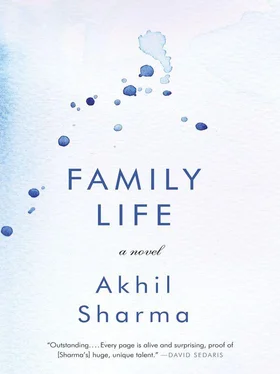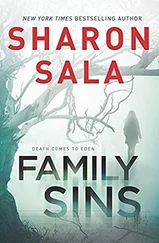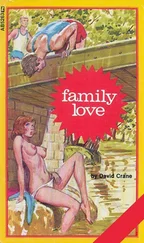We were shown around by a woman in her fifties. She had blond hair and wore a wool suit buttoned with large buttons to the neck. As we walked down the hall on either side of her, the woman explained the therapy programs the home used. Every patient had physical therapy every day from a therapist, not an aide. Every patient also received stimulation therapy including speech therapy.
My mother, sounding nervous, asked, “Have you ever had a patient like Birju start talking?”
The woman stopped. She looked at my mother. “I am sorry. I wish I had.” She paused again. “The oral therapy is so that the patient’s ability to swallow doesn’t diminish.”
As we continued down the hall, the woman pointed to a nurses’ station, a counter in the hallway. “Each station has a computer.”
My father had his hands behind his back, as if we were in an expensive store and he didn’t want anyone to think he might steal something. In the car, he had said to my mother that there was no point in going to a place we could not afford.
My father asked the woman, “Do you use those pads that let the nurses know if the patient has soiled himself?”
“Yes.”
My mother told the woman about how Birju didn’t get his food on time and then he vomited his medicines. “That shouldn’t happen,” the woman said. “That is unacceptable.” Perhaps because my mother looked distressed, the woman said, “Beclamide is quickly absorbed. He probably doesn’t lose too much.”
Everything about the home was wonderful. Around every corner was a nurses’ station with women in white uniforms. Everywhere we went, there was the smell of potpourri instead of the sour odor of recently cleaned shit. The hallway walls had black streaks at the height of wheelchair wheels and chipped paint at the height of gurneys, but these were minor things.
I thought about the three hundred thousand that the lawyers had taken. I thought that if Birju had not had his accident, he would have become a surgeon, and we would have been able to afford the home.
At some point I fell behind my parents. I started walking with my eyes closed. I swung my head from side to side and twirled in circles as I walked.
“Go outside,” my mother scolded. “Don’t leave the porch.”
The porch was covered in black rubber matting. I left it and went onto the lawn. I found a branch and began dragging it around the house. The house flashed its windows at me and I felt as if it knew we could not afford to bring Birju there and yet were wasting people’s time.
We went to other homes. Going to a home was like being on holiday. We were not at the nursing home with Birju but we were also doing our duty, and so there wasn’t the guilt that came from being away from him.
Once, we went to a home in Boston. The home was a series of row houses along a wide road. Inside one, a young man with a blond mustache took us on a tour. On a stairway landing that had blue Wet Paint signs on the walls, we met a nurse, a very fat woman with a port-wine stain on her cheek. The young man introduced her. The nurse said, “I wouldn’t put anybody from my family here. They say they give stimulation therapy every day. All they do is put patients in a room together and turn on the TV. Animal shelters do the same.” While the nurse was speaking, the young man smiled and stared blankly at the wall behind my parents and the woman.
The nicest trip we ever took was to New Hope, Pennsylvania. New Hope was a tourist town, with little houses that spread up one side of a river valley. The nursing home was like most nursing homes: it had a sunny cafeteria where old people damaged from strokes sat in wheelchairs spitting food, and hallways that had closed doors with signs that the person within had pneumonia.
Once we had seen the home, we went for a walk around the town. There were ice cream shops and shops selling tee shirts. I saw something called an invisible dog leash. The waves against the river embankment sounded like window blinds lifting and falling in the wind, and the water, disturbing the reflections of the clouds, resembled waves slipping over ice floes.
MY PARENTS BEGAN to speak of buying a house where they could take care of Birju themselves.
“Even if we found a good nursing home, I would have to go there every day,” my mother said.
Mr. Narayan sat by Birju’s bed. It was a weekend afternoon. “Living with him sounds very hard,” he said meekly.
“It isn’t fair for Birju’s mother to have to come every day,” my father said. He was standing and drinking tea. “How long can she do this? She has to have a life, too.”
Mr. Narayan didn’t answer. He was quiet for a moment, and he looked like he was concentrating earnestly, trying to comprehend something that was beyond him. When he spoke, he sounded hesitant. “Still, it sounds very hard.”
“If we don’t come every day,” my mother said, “he will get bed sores, he will get infections, he’ll die. We have no choice. Either we do everything, or we do nothing.”
A few days later, after prayers at temple, Mr. Narayan introduced us to a real estate agent. Mr. Gupta was tall, muscular, handsome. He had a ring on every finger, and to me, because I assumed they were worn for luck, he looked superstitious, as business people tend to be. Mr. Narayan said that Mr. Gupta would help us and not charge a commission. Mr. Gupta said, “It would be a blessing for me if I can be of help.”
At this generosity, my mother began telling him how terrible our life was. “I get so scared every morning,” she said. “When I walk into the nursing home, I think, What am I going to discover today? ” My mother did not normally complain to strangers, but perhaps she assumed that somebody willing to do us such a favor must feel a great deal of sympathy and so she could be honest.
Mr. Gupta stood silently, politely before us.
“Thank you,” my father said.
A few days later, we went with Mr. Gupta to look at houses. Mr. Gupta owned a blue Mercedes sedan. None of us had ever sat in a Mercedes before. This was exciting.
My father got into the front passenger seat, and my mother and I got in the back. It was a Saturday afternoon in spring.
As we drove, apropos of nothing, my father said, “Mr. Gupta, the tastiest food I’ve ever eaten was cooked over dung fire.”
Mr. Gupta didn’t say anything. He stared ahead as he drove slowly, his hands near the top of the steering wheel.
“I think there is something about dung that makes flavors sweet.”
My father looked at Mr. Gupta as if he wanted a reaction. There was an eagerness to his face, and I could tell that he felt important because he was riding in a Mercedes and was going to spend thousands of dollars.
“I think so, too,” Mr. Gupta finally said, switching on the turn signal. “I’ve told my children this. ‘Dung!’ they say. ‘Eeew!’”
“I like simple things. Simple things are sufficient. A roti, some pickle, maybe a dry subji. That is enough.”
“The best things are simple,” Mr. Gupta agreed. “I don’t like rich things with cheese. You have to stay up half the night digesting.”
“Happiness can only be found inside oneself. It can’t be found on the outside in expensive things. You hear that, Ajay?”
My mother stared out the window.
“Did you hear?”
“Yes, Daddy.”
“I worry about India,” my father said to Mr. Gupta.
“Why is that, Mr. Mishra?”
“Even the smallest things people don’t do. Mahatma Gandhi advised, after you relieve yourself, just cover it with a little dirt so the flies don’t spread disease. Does anybody do that? That’s the kind of people India has.”
“I hate to say it, but it’s true.” Mr. Gupta said this without emotion. To me he appeared to be agreeing because this was the polite thing to do.
Читать дальше












